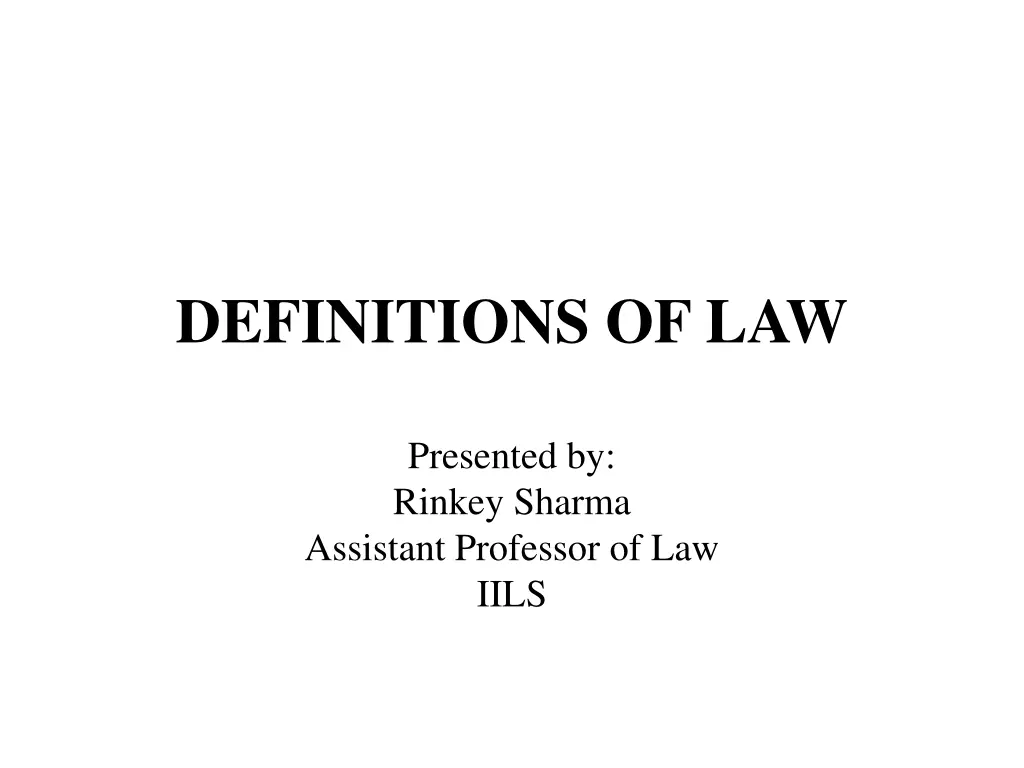
Various Definitions of Law by Renowned Jurists
Explore diverse perspectives on the concept of law as defined by prominent legal scholars such as Salmond, Austin, H.L.A. Hart, Savigny, Dean Roscoe Pound, and others. Delve into varying views that define law as a body of principles recognized by the state, a set of rules determining legal rights and duties, an aggregate of commands by sovereign authority, a product of social engineering, and more.
Download Presentation

Please find below an Image/Link to download the presentation.
The content on the website is provided AS IS for your information and personal use only. It may not be sold, licensed, or shared on other websites without obtaining consent from the author. If you encounter any issues during the download, it is possible that the publisher has removed the file from their server.
You are allowed to download the files provided on this website for personal or commercial use, subject to the condition that they are used lawfully. All files are the property of their respective owners.
The content on the website is provided AS IS for your information and personal use only. It may not be sold, licensed, or shared on other websites without obtaining consent from the author.
E N D
Presentation Transcript
DEFINITIONS OF LAW Presented by: Rinkey Sharma Assistant Professor of Law IILS
INTRODUCTION The term Law denotes different kinds of rules and Principles. Law is an instrument which regulates human conduct/behavior. Law means Justice, Morality, Reason, Order, and Righteous from the view point of the society. Law means Statutes, Acts, Rules, Regulations, Orders, and Ordinances from point of view of legislature. Law means Rules of court, Decrees, Judgment, Orders of courts, and Injunctions from the point of view of Judges. Therefore, Law is a broader term which includes Acts, Statutes, Rules, Regulations, Orders, Ordinances, Justice, Morality, Reason, Righteous, Rules of court, Decrees, Judgment, Orders of courts, Injunctions etc.
DEFINITIONS OF LAW Various schools of law have defined law from different angles. The following are the definitions of various jurists: a. Salmond: - According to salmond the law may be defined as the body of principles recognized and applied by the state in the administration of Justice. b. John chipman Gray s Definition of Law:- According to Gray, the Law of the State or of any organized body of men is composed of the rules which the courts, that is the judicial organ of the body lays down for the determination of legal rights and duties.
Austin: According to Austin law is aggregate of rules set by men politically superior or sovereign to men as politically subject. Austin says, A law is command which obliges a person or persons to a course of conduct. H.L.A.Hart :According combination of primary rules of obligations and secondary rules of recognition. Savigny- Savigny says that law is not the product of direct legislation but is due to the silent growth of custom or the outcome of unformulated public or Professional opinion. He says that law not as a body of rules set by determinate authority but as rules consist partly of social habitat and partly of experience. He says law is found in the society, it is found in custom. to Hart Law is the
Dean Roscoe Pound: Pound defines law as a social institution to satisfy social wants. He says law is a social engineering, which means that law is a instrument to balance between the competing or conflicting interests. Holmes: He says, that the prophesies of what the courts will do, in fact and nothing more pretentions, are what I mean by law.
